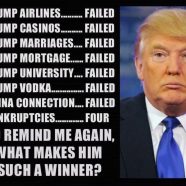
The revelations from Trump’s tax records in late September demonstrate two fundamental lessons about branding: (1) how smart branding can generate new opportunities and lots of financial rewards, and (2) the crippling pitfalls of not managing and sustaining a lifestyle brand with consistent integrity and credibility.
A “lifestyle brand” is based primarily on the perceived image of a particular person. For example Martha Stewart and Ralph Lauren are noteworthy lifestyle brands, as is Donald Trump. They all have a reputation for admired success that resonates with their customers, so much that it evokes an impression that anything with their name on it must also have high quality and a great value. Consumers want to feel connected with the acclaimed success behind each personal brand. They simply “want a piece of it” and for Trump fans, be part of his success story.
Trump’s businesses actually suffered bankruptcies and escalating losses throughout the 1990’s, culminating in a net loss of $352.8 million in 2002, although few people knew this. Then the start of his captivating TV show, “The Apprentice” in 2004, allowed Trump to reinvent himself and capitalize on his rejuvenated lifestyle brand with a new financial lifeline. Trump was positioned as a savvy business mogul with a Midas touch, and was now “giving back” to society, educating the public on his can-do spirit and how he provides jobs and economic security for so many.
The show’s success (i.e. he earned $197 million over 16 years) led to new opportunities for Trump to rent out or license his name for a wide variety of products and services, which generated a windfall of another $230 million. Some examples:
- Consumer Products – steaks, vodka, a board game, cologne, vitamins (the “Trump Network”), mattresses, plus neckties, shirts and underwear associated with the Phillips-Van Heusen brand.
- Services – exaggerated and misleading programs like the get-rich-quick “Donald Trump Way to Wealth” seminars and his infamous “Trump University” for which he paid $25 million in a legal settlement in 2016.
- Properties – numerous hotels with his name around the world, 17 office buildings in Manhattan (he owns only 6 of them), casinos and 11 more golf courses he acquired after 2006 that are now generating staggering losses.
- Product Endorsements – pitching various brands such as Domino’s Pizza ($500,000), Double Stuff Oreos ($500,000), All Laundry Detergent ($850,000), speaking engagements ($7.3 million), co-authored books (“Think Big and Kick Ass: In Business and Life” – $1.4 million in royalties), and even using The Apprentice” TV show to market many of his branded products.
Trump indeed did a masterful job creating and cultivating a successful lifestyle brand that apparently generated a fortune for him, especially using “The Apprentice” as a springboard for licensing his name, arguably to an over-extended array of diverse products and services. At its core was his image of a self-made billionaire. He bragged that “I used my brain, I used my negotiating skills, and I worked it all out. Now, my company is bigger than it ever was and stronger than it ever was.”
However, it later became evident that his image-making outperformed his business successes. Consumers’ infatuation with the Trump “gold and glitz” started to decline after 2010 when his licensing deals had reached a peak of $29.7 million. The NY Times report in late September revealed how his chronic losses from failed hotels and golf resorts contributed to the unmasking of his lifestyle brand. He paid only $750 in taxes in 2016 and 2017, and paid no income taxes in 10 of the previous 15 years; he now is debt for $421 million, although we don’t know to whom.
A brand essentially represents a promise of a benefit to a target audience, an added value that must be consistently delivered. The Trump lifestyle brand connotes wealth and success, normally an inspiration for his fans. However, the legitimacy of his brand rests on credibility and trust. The reality is that he generated huge losses, not gains over the past 30 years. While some may admire him for “gaming the tax system”, his claims were untrue and hence more consumers today consider Trump to be a fraud, not a wildly successful businessman. His dishonesty and undelivered promises, revealed with the recent tax reports, are the main reasons why his lifestyle brand and reputation are in so much trouble today.


